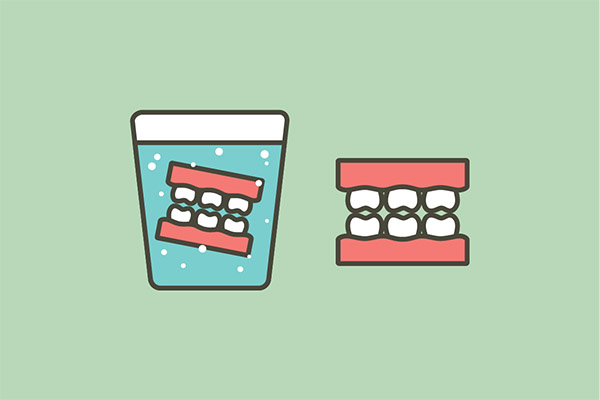 If you are new to the denture world, you may be curious about denture care and how often you should be cleaning your new teeth. Having dentures is just like having your natural teeth. This is one thing that many people fail to recognize. It is also the biggest reason some people’s dentures do not last if they should, from the lack of proper care and cleaning. So how often should you really clean your dentures?
If you are new to the denture world, you may be curious about denture care and how often you should be cleaning your new teeth. Having dentures is just like having your natural teeth. This is one thing that many people fail to recognize. It is also the biggest reason some people’s dentures do not last if they should, from the lack of proper care and cleaning. So how often should you really clean your dentures?
Clean your dentures daily
The simple answer to this question is every day. Just like natural teeth, your dentures still need to be brushed at least one to two times each day. Brushing is only the first step in the cleaning process when it comes to denture care. Invest in a soft bristle brush, hard bristles can damage and scratch your dentures, so it is best to avoid them. Use an approved denture cleaner or a homemade solution of half vinegar and water to clean your dentures.
Brush in slow, small strokes in a circular motion when cleaning to be sure to remove all the plaque, bacteria, and any food debris left in or on your dentures. Do not forget to pay attention to the crevices that hold your dentures in place in your mouth. Food and bacteria like to get trapped in here, as well as hardened adhesive. Make sure you remove any adhesive from your dentures because once it hardens, this can make it difficult to get off and cause your dentures to not fit properly.
Give them a good soak
Let us not forget that you should still soak your dentures every day as part of your denture care routine. Soaking your dentures will help to keep them moist and prevent them from drying out. Plus, you should be removing your dentures from your mouth at least once a day for a period of 6 to 8 hours, so soaking them overnight may be the best option for you. Removing your dentures for this period helps the soft tissues in your mouth and bone structure to heal and recover. This process, along with soaking your dentures and keeping them pliable, can help to extend the life of your dentures and keep your mouth feeling good.
Do not forget your mouth
Speaking of your mouth, you still want to make sure you do the proper oral care on your mouth, even with dentures. You can brush your gums, tongue, and the roof of your mouth. This can remove any food debris and bacteria that are left in your mouth. You can even rinse your mouth out with a mouth wash when you are not wearing your dentures. Take time to make sure you care for your mouth just as you would when you had natural teeth. Ensuring you take all the proper steps in your denture care routine can help not only keep your dentures around and lasting longer but help keep your mouth healthy!
Related Posts
Dentures can be a great way to replace missing teeth, but they require regular denture care and maintenance. In fact, dentures can last for ten or more years with proper denture care. How long dentures will last depends on how well and how often you take care of them.Dentures rarely need repairs, but dentists recommend…
When you are new to wearing dentures, you have many questions involving your denture care. Some people who wear dentures and do not have any natural teeth left believe they no longer need to see their dentist regularly like they used to. For many reasons, making sure you still see your dentist for regular appointments…
Denture care is one of the most essential steps in preventing gum disease. Gum disease can lead to tooth loss and other health issues like heart disease, stroke, and diabetes. Dentures are a common and vital dentistry tool dentists use to repair tooth damage, fill cavities or even replace missing teeth. Dentures play a considerable…


